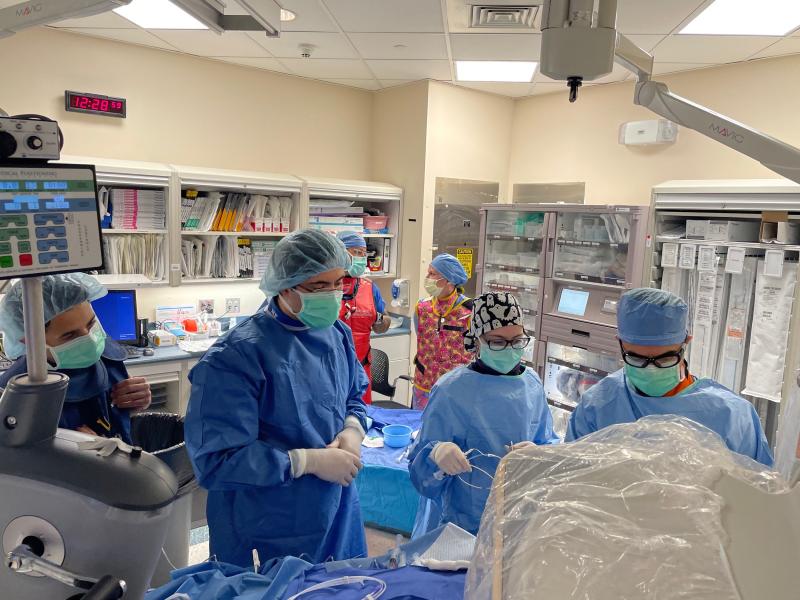
Shifting the Heart’s Fuel Source
For Dr. Senthil Selvaraj, a heart failure physician-scientist in the Duke Heart Center, and an assistant professor of Medicine in the Duke Molecular Physiology Institute and the Division of Cardiology, the path to improving care for patients with heart failure with preserved ejection fraction (HFpEF) starts with a deceptively simple question: what does the heart and skeletal muscle actually use for fuel—and can we change that?
HFpEF affects more than half of all people with heart failure and is notoriously difficult to treat. These patients retain normal pumping function but still experience debilitating symptoms like shortness of breath and reduced ability to exercise.

“HFpEF is a systemic problem,” Dr. Selvaraj explains. “It’s not just the heart. It’s also skeletal muscle, blood vessels, and the body’s metabolism.”
Recent studies have shown that failing hearts rely more heavily on ketones, a type of energy source the body normally produces in small amounts during fasting or metabolic stress. Inspired by that discovery, Dr. Selvaraj began testing whether raising ketone levels on purpose—through exogenous ketone drinks—could help HFpEF patients function better.
He recently led a clinical trial known as “KETO-HFpEF”, published in JACC: Heart Failure, which tested the effects of a single dose of ketone therapy vs. placebo in patients with HFpEF. The study did not show improvements in exercise performance, but the treatment led to several potentially beneficial physiologic changes, such as lower heart pressures, shifts in metabolism away from carbohydrate utilization, and increased heart rate during exercise.
“These findings were intriguing,” he says. “We didn’t see a direct improvement in exercise capacity, but we saw a lot of changes that may be relevant.”
From Proof-of-Concept to Longer-Term Impact
Dr. Selvaraj is now preparing to launch a new trial to test whether longer-term ketone supplementation might do what a single dose could not. The upcoming study, supported by a Swann Lee Award through the Duke School of Medicine, will follow 20 HFpEF patients over an eight-week period using a crossover, double-blind, placebo-controlled design. Participants will receive a commercially available ketone drink, (R)-1,3-butanediol (KetoneIQ), and undergo testing to evaluate changes in exercise capacity, cardiac function, metabolic health, and vascular stiffness. This research team includes Heart Center faculty Drs. Svati Shah, Robert Mentz, and Neha Pagidipati.
“Exercise intolerance in heart failure is driven by multiple overlapping issues,” he says. “That’s why we’re investigating ketone therapy—which has the potential to address several pathophysiologies at once.”
Dr. Selvaraj also studies how the heart consumes fuel in real time. In a translational research project at Duke, he and his colleagues collect paired blood samples from the arteries and veins of the heart to measure what nutrients the heart consumes. This work, done in collaboration with Drs. Marat Fudim, Imran Islam, Zach Loring, and Dan Friedman, helps map the heart’s metabolic profile across the spectrum of cardiovascular health.
Research with a Broader Purpose
Dr. Selvaraj traces his interest in heart failure back to his third year of medical school, when he first began working in the field. His early work focused on large-scale clinical trial data, but he has since shifted toward leading his own investigator-initiated studies—smaller in scale, but rich in mechanistic insight.
He credits much of his growth as a researcher to the mentorship of Dr. Svati Shah and sees his current work as part of a broader effort to redefine how metabolic therapies are used in cardiovascular disease.
“Ketones are a natural substrate, something our bodies already make,” he says. “If we can harness that safely and effectively, we may be able to offer patients a new option—one that works across systems, not just on the heart alone.” Beyond ketone therapy, altering metabolism with other therapies (i.e. SGLT2 inhibitors and GLP-1 receptor agonists) has already underscored the relevance of this line of inquiry.